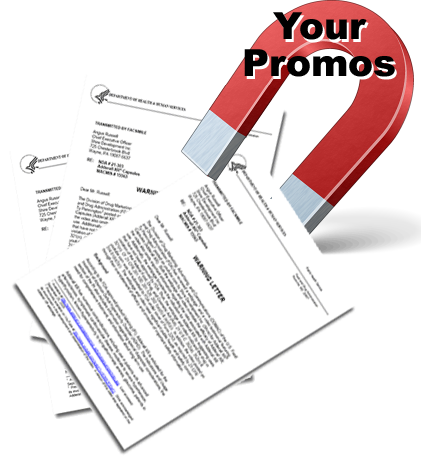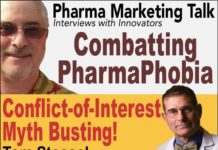Create Squeaky-Clean Pharma Ads Tricks & Tips to Avoid FDA Letters Pharmaguy interviews Dale Cooke, Principal, PhillyCooke Consulting (see Bio), about topics he covered during a two-day interactive workshop — “Building a World-Class Advertising and Promotion Review Program” — on October 15 and 16, 2014. Cooke also shared a few tips on how to comply with recent FDA social media draft guidances.
Pharmaguy interviews Dale Cooke, Principal, PhillyCooke Consulting (see Bio), about topics he covered during a two-day interactive workshop — “Building a World-Class Advertising and Promotion Review Program” — on October 15 and 16, 2014. Cooke also shared a few tips on how to comply with recent FDA social media draft guidances.
Air date: 23 September 2014
Your browser does not support the audio element. Upgrade your browser to one that does
 Good news, millions of people are seeing your promotions, but don’t forget… the FDA is seeing them too.
Good news, millions of people are seeing your promotions, but don’t forget… the FDA is seeing them too.
FDA marketing scrutiny no longer is limited to magazine and TV ads. Now the agency is poking around, checking signage in tradeshow booths… checking in on Twitter and Facebook… and listening to the physicians and other healthcare professionals you’ve paid to speak or train.
Darn near everything is fair game in this brave new regulatory world — even though some say FDA social-media guidances raise more questions than they answer.
And don’t forget FDA’s Bad Ad program, which deputizes every healthcare professional in America to alert FDA on non-compliant promotional activities and tactics.
According to Manhattan Research’s 2012 Taking the Pulse survey of U.S. physicians, 85 percent of physicians use search engines daily or weekly. In America, 85 percent of all adults have a cell phone, and increasingly, they are using their cell phones for activities other than making phone calls. Indeed, for many people, making phone calls is the second, third, or even fourth most common use of their cell phone. Instead, people are using these portable computers in their pockets to send and receive messages (both SMS and emails), visit websites, and download and use one of the million-plus apps available.
Clearly, people (both physicians and non-physicians) are no longer accessing information in the same way they used to. Pharmaceutical companies and others who produce prescription products have started to provide product information to people via these new channels, but doing so has not been easy.
Face it: You need help. Make sure your promotional activities aren’t magnets for FDA warning letters!
Questions/Topics of Discussion
- Can you provide a quick review of recent FDA social media draft guidelines?
- Some experts have said that these guidances raise many more questions than they answer. Can you give us a few examples?
Guest Bio
 Dale Cooke is owner of PhillyCooke Consulting and serves on the faculty of the University of California San Francisco’s American Course on Drug Development and Regulatory Sciences. He helps companies use 21st century technology to connect with today’s healthcare consumers and professionals while ensuring compliance with FDA regulations written in the 1960s.
Dale Cooke is owner of PhillyCooke Consulting and serves on the faculty of the University of California San Francisco’s American Course on Drug Development and Regulatory Sciences. He helps companies use 21st century technology to connect with today’s healthcare consumers and professionals while ensuring compliance with FDA regulations written in the 1960s.
Dale is the author of Effective Review & Approval of Digital Promotional Tactics and is currently writing a book about compliant social media usage for prescription product manufacturers.









![6 Digital Tools at the Center of Healthcare Digitalization [INFOGRAPHIC]](http://ec2-54-175-84-28.compute-1.amazonaws.com/pharma-mkting.com/wp-content/uploads/2021/04/6DigitalTools_600px-100x70.jpg)




